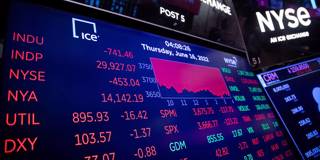The release of data showing that the US economy has contracted for two quarters in a row has triggered an intense semantic debate among economists, pundits, and political operatives. The Biden administration and many commentators are at pains to deny that the US is in a recession, but history is not on their side.
CAMBRIDGE – The latest figures from the Bureau of Economic Analysis (BEA) show that the US economy has experienced two consecutive quarters of negative real (inflation-adjusted) GDP growth. That accords with a popular definition of a recession. But economists have noted that any official declaration of a US recession must come instead from the National Bureau of Economic Research (NBER), which carefully assesses various monthly macroeconomic indicators observed over extended periods.
Given the intensity of this debate in the media, one might think that the popular and official assessments often contradict each other. But that is not the case. Since 1948, and prior to the current episode, BEA data on real GDP reveal ten periods with two or more consecutive quarters of negative growth – in 1949, 1954, 1958, 1970, 1975, 1980, 1982, 1991, 2009, and 2020 – all of which correspond to the NBER’s eventual declaration of a recession.
In other words, the “two-consecutive-quarters” metric has had no false positives since 1948. If one takes the eventual NBER verdict as truth, one must also accept that two consecutive quarters of negative real GDP growth have consistently forecasted a recession for the past 74 years.

CAMBRIDGE – The latest figures from the Bureau of Economic Analysis (BEA) show that the US economy has experienced two consecutive quarters of negative real (inflation-adjusted) GDP growth. That accords with a popular definition of a recession. But economists have noted that any official declaration of a US recession must come instead from the National Bureau of Economic Research (NBER), which carefully assesses various monthly macroeconomic indicators observed over extended periods.
Given the intensity of this debate in the media, one might think that the popular and official assessments often contradict each other. But that is not the case. Since 1948, and prior to the current episode, BEA data on real GDP reveal ten periods with two or more consecutive quarters of negative growth – in 1949, 1954, 1958, 1970, 1975, 1980, 1982, 1991, 2009, and 2020 – all of which correspond to the NBER’s eventual declaration of a recession.
In other words, the “two-consecutive-quarters” metric has had no false positives since 1948. If one takes the eventual NBER verdict as truth, one must also accept that two consecutive quarters of negative real GDP growth have consistently forecasted a recession for the past 74 years.